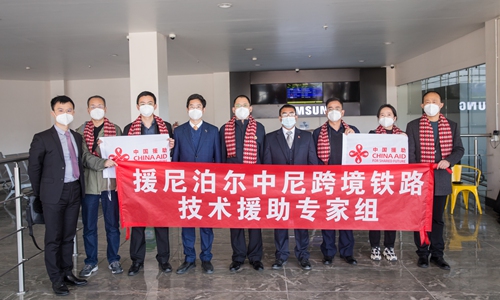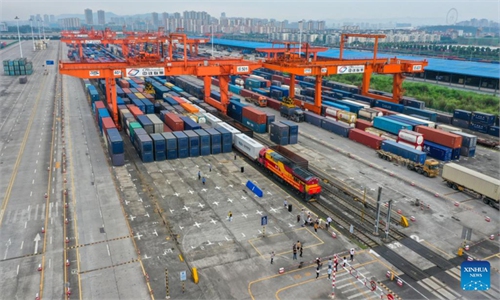Exclusive: Nepal expects ‘positive outcome’ from feasibility study on cross-border railway: Nepali envoy

Chinese technical experts arrive in Kathmandu, the capital of Nepal, on December 27, 2022 for a feasibility study and survey of the China-Nepal cross-border railway. Photo: Courtesy of the Chinese Embassy in Nepal
Six Chinese technical experts arrived in Kathmandu, the capital of Nepal, on Tuesday for a feasibility study and survey of the China-Nepal cross-border railway, which officials from both sides said marks another important step for the project as the two countries move forward to build the "heavenly road" across the Himalayas.
The railway, an integral part of jointly building the Belt and Road Initiative (BRI) between China and Nepal, has been a long-cherished dream of the Nepali people and an important consensus reached by the leaders of the two countries, the Chinese Embassy in Nepal said in a statement sent to the Global Times on Wednesday.
China gives priority to Nepal's aspirations and needs in this regard, and will proactively push ahead with the feasibility study with a grant from China, the statement said.
"The two countries will maintain close contact and coordination in jointly carrying out the work ahead with a view of building a trans-Himalayan multi-dimensional connectivity network," according to the Chinese Embassy.
China's State Councilor and Foreign Minister Wang Yi and Nepal's Foreign Minister Narayan Khadka agreed during Khadka's official visit to China in August to proceed with the feasibility study.
Bishnu Pukar Shrestha, the Nepali Ambassador to China, told the Global Times in an exclusive written interview on Wednesday that the first visit of Chinese experts to Nepal for the feasibility study is crucial for both Nepal and China, which will help promote land connectivity.
"Other teams will also follow and I believe that the survey will come up with a positive outcome that will contribute to enhancing economic, trade and people-to-people relations," the ambassador said.
The project is immensely significant for Nepal to fulfill its drive for socioeconomic transformation, and it will bring the two countries, the two governments and their peoples closer with the development of important infrastructure, he further noted.
Railway construction from Gyirong in Southwest China's Xizang Autonomous Region to Kathmandu will help reduce the structural disadvantages of the landlocked country.
Shrestha said that both Nepal and China will be able to transport goods quickly and cheaply, and bilateral trade will also increase, which will help reduce Nepal's huge trade deficit.
The railway is a major project under the BRI, for which China and Nepal in 2017 signed a cooperation agreement.
Shrestha said that Nepal has high expectations for the railway, and "as a close neighbor, Nepal highly appreciates the grand design of the BRI of China and hopes that both countries can work together for the cause of the common prosperity of mankind."
The ambassador said that Nepal believes connectivity is key for the development of a landlocked country like Nepal, which is situated between China and India.
"Nepal and China are close neighbors, trusted friends and reliable development partners. Their relations are marked by mutual trust, understanding and cooperation," Shrestha said, describing the construction of the railway as a milestone to take the friendly relations to a new height.
The railway will transform Nepal into a gateway to South Asia, he said.
The China-Nepal cross-border railway will also serve as a key part of the trans-Himalayan transportation network and infrastructure.
The Nepal section is about 74 kilometers long, with a standard gauge and single-line electric traction.
However, construction is not an easy task due to harsh natural conditions.
There are huge differences in terrain height and abnormally complex geology, in addition to other challenges such as the lack of basic research data, making the project one of the most difficult in the world when it comes to survey, design and construction.
Despite these difficulties, both sides expect the survey to be well conducted.
China Railway First Survey and Design Institute Group Co, which is undertaking the survey, has rich experience in the design of railways, including in plateau and mountainous areas in China, according to the Chinese Embassy.
The company has undertaken survey and design tasks for several challenging projects, including the Qinghai-Tibet Railway and Sichuan-Tibet Railway.
Feng Dequan, the project team leader, said that they will fully adapt China's advanced technology and rich experience in building railways in difficult and complex mountainous and plateau areas.
"We will work with the Nepali side to overcome difficulties and do a good job in the technical research work," Feng said, according to the Xinhua News Agency on Wednesday.
The advanced science and technology of China can easily transform the dream of railway connectivity between Nepal and China into a reality, just as China has helped Laos and other east Asian and central Asian countries, the Nepali ambassador said.

